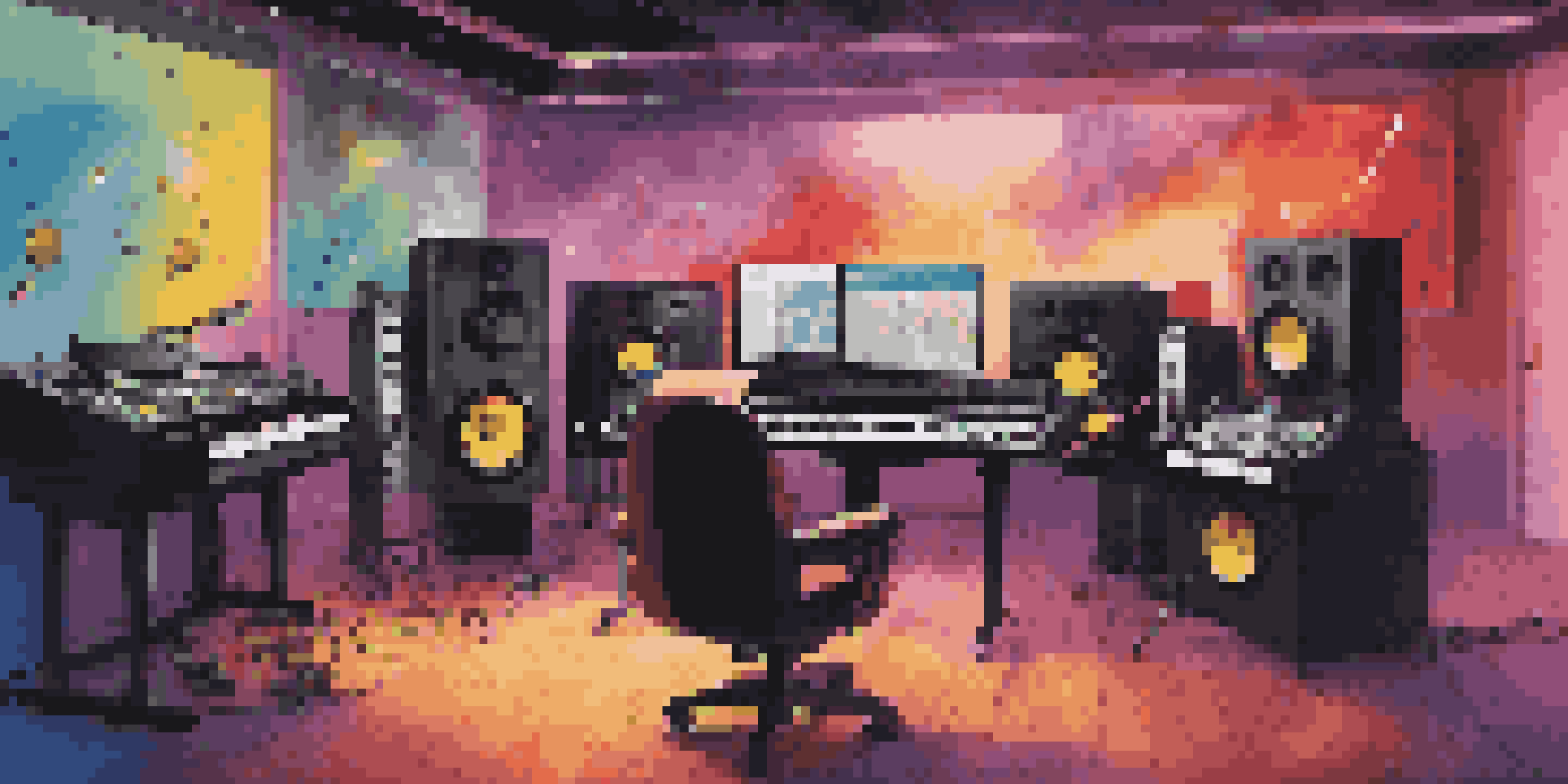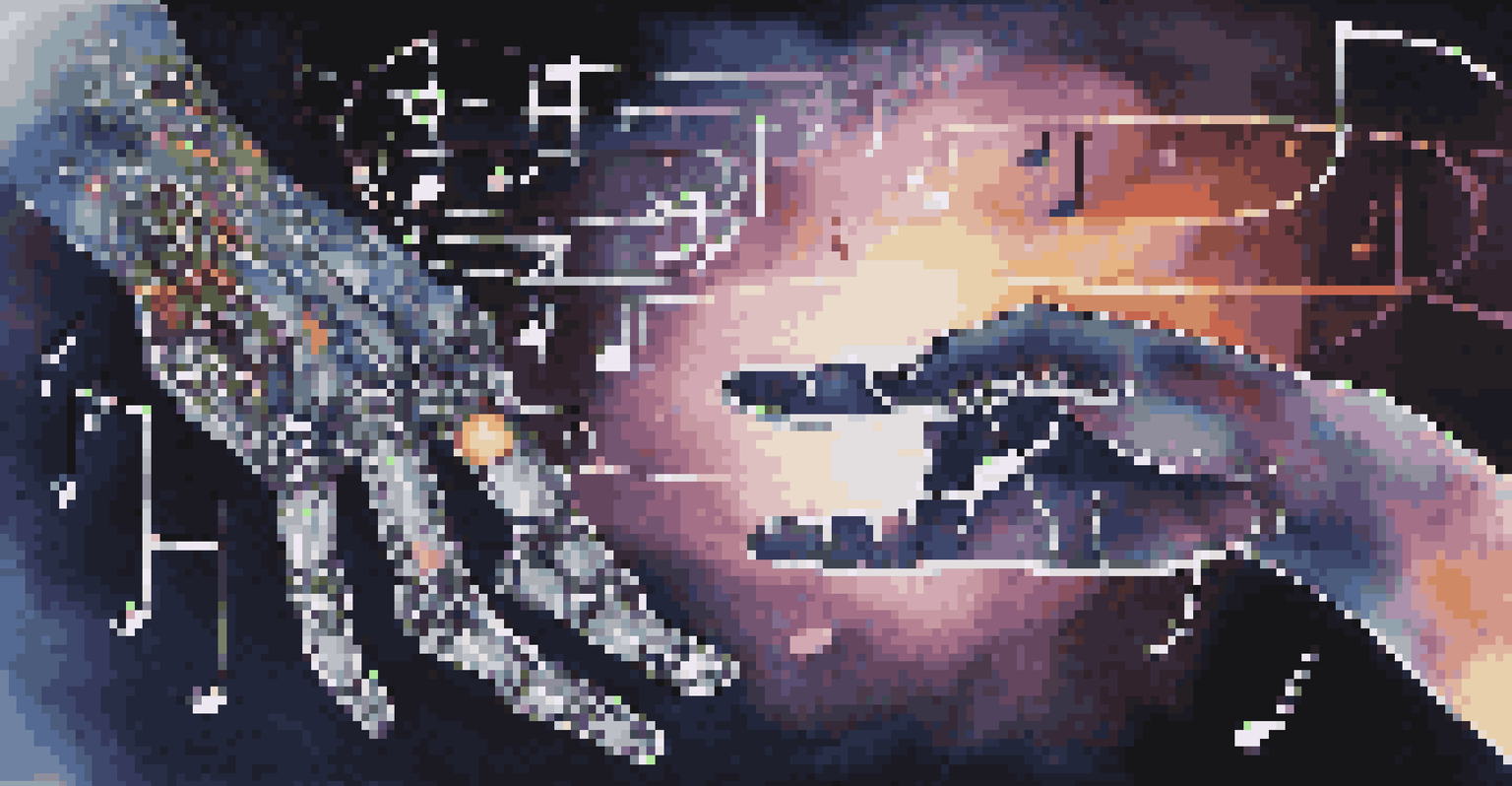From Beats to Lyrics: AI's Role in Complete Music Creation

The Evolution of Music Creation with AI
Music has always been a blend of creativity and technology, but AI is taking this relationship to new heights. From generating beats to crafting lyrics, AI tools are now integral to the music creation process. These technologies have evolved rapidly, allowing artists to explore new sounds and ideas that were previously unimaginable.
The future of music will be a collaboration between humans and machines, where technology acts as a partner in the creative process.
One of the most exciting aspects of AI in music is its ability to analyze vast amounts of data. By studying patterns in existing music, AI can suggest melodies, chord progressions, and even lyrical themes that resonate with listeners. This data-driven approach not only enhances creativity but also streamlines the songwriting process.
As we dive deeper into this evolution, it's clear that AI isn't just a tool—it's becoming a collaborative partner for musicians. It's akin to having a co-writer who can offer fresh perspectives and innovative ideas, ultimately enriching the creative landscape.
AI Tools Revolutionizing Music Composition
When it comes to music composition, AI tools like OpenAI's MuseNet and Google's Magenta are making waves. These platforms can generate original compositions in various genres, giving artists a starting point for their work. Imagine having an AI-generated symphony that you can tweak and personalize to fit your vision—that's the power of modern technology.

These tools often use machine learning, a branch of AI that allows systems to learn and improve from experience. By analyzing existing music, they can produce new pieces that maintain a similar style or mood, helping artists break through writer's block. This capability not only enhances creativity but also broadens the scope of what artists can achieve.
Ultimately, these AI tools can serve as a springboard for musicians, allowing them to explore new avenues in their creativity. By combining human intuition with AI's analytical power, the possibilities for music composition are virtually limitless.
The Role of AI in Lyric Writing
While melodies and rhythms are crucial, lyrics are the soul of a song. AI has made significant strides in generating lyrical content that captures emotion and storytelling. Tools like Jukedeck and Lyric Generator analyze themes and styles to create lines that fit seamlessly into a song.
AI is a tool, and like any tool, it’s how you use it that makes the difference in creating art.
For artists struggling with lyrics, these AI-driven platforms can provide a much-needed creative boost. They can suggest phrases or complete verses that resonate with the intended message, making the writing process more fluid. It's like having a brainstorming session with a digital collaborator who always has fresh ideas.
However, it's essential to remember that while AI can assist in lyric writing, the human touch remains irreplaceable. After all, the most powerful lyrics often come from personal experiences and emotions. The best approach is to use AI as a tool to enhance, rather than replace, the artist's voice.
The Impact of AI on Music Production
AI is not only transforming how we create music but also how we produce it. Tools like LANDR use AI algorithms to master tracks, ensuring they sound polished and professional while saving time and costs. This democratization of music production means that even emerging artists can achieve high-quality sound without breaking the bank.
Moreover, AI can analyze trends within the music industry, helping producers understand what sounds are currently popular. This data can guide decisions on arrangements, mixing, and even marketing strategies. By leveraging AI's insights, producers can create music that resonates with audiences more effectively.
As a result, the production process becomes more accessible and less intimidating for new artists. With AI handling some of the technical aspects, musicians can focus on what they do best: creating music that speaks to their listeners.
AI and Personalization in Music Listening
AI's influence extends beyond creation and production; it also shapes how we experience music. Streaming platforms like Spotify and Apple Music use AI algorithms to personalize playlists and recommendations based on user preferences. This level of customization enhances listener engagement and satisfaction.
By analyzing listening habits, AI can suggest new tracks that align with a user's taste, effectively creating a unique listening experience. It's like having a personal DJ who knows exactly what you want to hear next—a delightful way to discover new music.
As artists, understanding these algorithms can be beneficial. Musicians can tailor their releases and marketing strategies to align with the trends identified by AI, increasing their chances of reaching a wider audience.
The Challenges of AI in Music Creation
Despite its many benefits, the integration of AI in music creation isn't without challenges. One major concern is the potential loss of the human element in songwriting. As we rely more on AI-generated content, there's a risk that music may become formulaic or lack emotional depth.
Additionally, the ethical implications of using AI in creative fields are still being debated. Questions arise about copyright, ownership, and the authenticity of AI-generated music. If an AI produces a hit song, who gets the credit—the artist, the programmer, or the AI itself?
These challenges underscore the importance of finding a balance between leveraging technology and preserving the artistry of music. As we navigate this new landscape, it's crucial to maintain the human connection that makes music so powerful.
The Future of Music Creation with AI
Looking ahead, the future of music creation with AI is bright and full of possibilities. As technology continues to advance, we can expect even more sophisticated tools that enhance the creative process. It's an exciting time for musicians, as AI can help them push boundaries and explore new styles.
Imagine a world where artists collaborate with AI to create entirely new genres or sounds that have never been heard before. This fusion of human creativity and machine learning could lead to groundbreaking innovations in music that redefine the industry.

Ultimately, the key will be to embrace AI as a partner in creativity rather than a replacement for human artists. By harnessing the strengths of both, we can look forward to a richer, more diverse musical landscape.